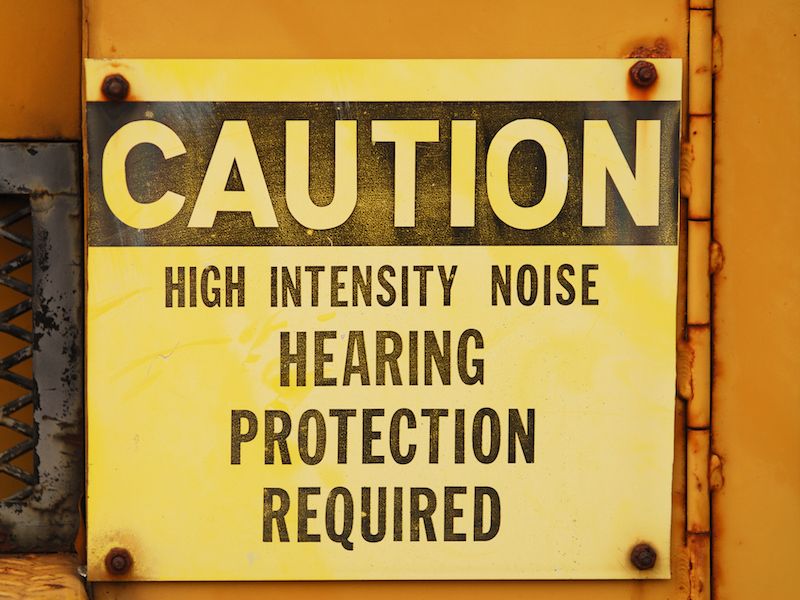
It’s one thing to realize that you should protect your ears. Knowing when to protect your ears is another matter. It’s not as simple as, for example, knowing when to use sunscreen. (Is it sunny and are you going to be outside? Then you need sunscreen.) Even knowing when you need eye protection is easier (Working with dangerous chemicals? Doing some building? You need eye protection).
It can feel as though there’s a significant grey area when addressing when to wear hearing protection, and that can be dangerous. Usually, we’ll defer to our normal tendency to avoid hearing protection unless we’re given information that a particular activity or place is hazardous.
A Tale of Risk Analysis
In general, we’re not very good at assessing risk, especially when it comes to something as intangible as permanent hearing damage or loss of hearing. Let’s take some examples to prove the point:
- Person A attends a very loud rock concert. The concert lasts roughly 3 hours.
- A landscaping company is run by person B. She spends a significant amount of time mowing lawns, then goes home to a quiet house and reads.
- Person C works in an office.
You might think the hearing danger is higher for person A (let’s just call her Ann). For the majority of the next day, her ears will still be screeching from the loud concert. It seems reasonable to assume that Ann’s recreation was very hazardous.
Person B (let’s just call her Betty), on the other hand, is subjected to less noise. Her ears don’t ring. So her ears must be safer, right? Not necessarily. Because Betty is mowing all day. So even though her ears don’t ring out with pain, the injury accrues little by little. If experienced on a regular basis, even moderately loud noise can have a negative affect on your hearing.
Person C (let’s call her Chris) is even less clear. Lawnmowers have instructions that emphasize the hazards of persistent exposure to noise. But even though Chris works in a quiet office, she has a really noisy, hour-long commute every day through the city. Additionally, while she works behind her desk all day, she listens to her music through earbuds. Does she need to consider protection?
When is it Time to Start to Think About Protecting Your Hearing?
The standard guideline is that if you have to raise your voice to be heard, your environment is loud enough to do damage to your hearing. And if your environment is that noisy, you really should consider using earmuffs or earplugs.
The cutoff should be 85dB if you want to be scientific. Noises above 85dB have the capacity, over time, to lead to injury, so you should think about using hearing protection in those situations.
Your ears don’t have a built-in decibel meter to warn you when you reach that 85dB level, so countless hearing professionals recommend downloading specialized apps for your phone. You will be able to take the correct steps to protect your hearing because these apps will inform you when the noise is reaching a dangerous level.
A Few Examples
Even if you do download that app and bring it with you, your phone might not be with you wherever you go. So we may develop a good standard with a few examples of when to protect our hearing. Here we go:
- Driving & Commuting: Driving all day as an Uber or Lyft driver? Or perhaps you’re just hanging around downtown for work or boarding the train. The noise of living in the city is bad enough for your hearing, not to mention the added injury caused by turning up your tunes to drown out the city noise.
- Operating Power Tools: You recognize you will need hearing protection if you work all day in a factory. But what if you’re just working in your garage all day? Most hearing professionals will suggest you wear hearing protection when operating power tools, even if it’s just on a hobbyist basis.
- Exercise: You know your morning spin class? Or maybe your daily elliptical session. You might think about using hearing protection to each one. Those trainers who use sound systems and microphones (and loud music) to motivate you might be good for your heart rate, but all that loudness is bad for your hearing.
- Residential Chores: Even mowing a lawn, as previously stated, requires hearing protection. Chores, like mowing, are most likely something you don’t even think about, but they can result in hearing damage.
- Listening to music with earbuds. OK, this doesn’t require protection but does require caution. Whether your music is playing directly into your ears, how loud it is playing, and how long you’re listening to it are all things you should pay attention to. Consider using headphones that cancel out outside sound so you don’t have to crank up the volume to hazardous levels.
A strong baseline might be researched by these examples. When in doubt, however, you should choose protection. Instead of leaving your ears exposed to future damage, in most circumstances, it’s better to protect your hearing. Protect today, hear tomorrow.
